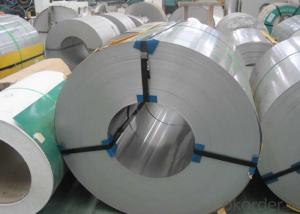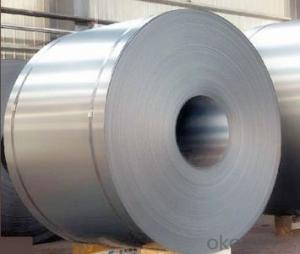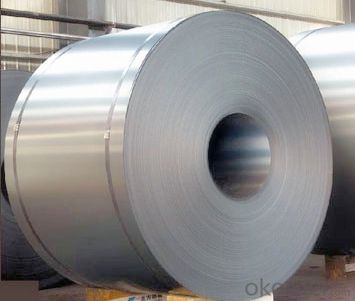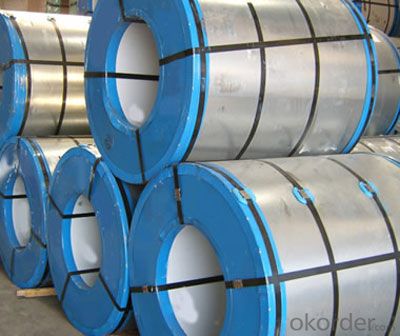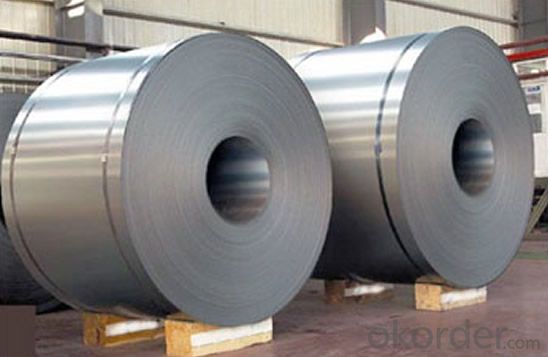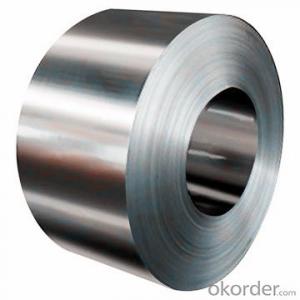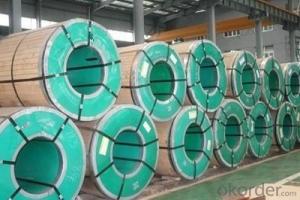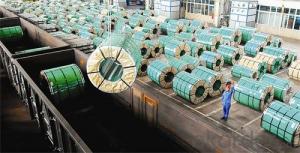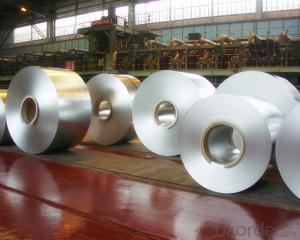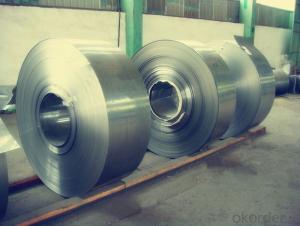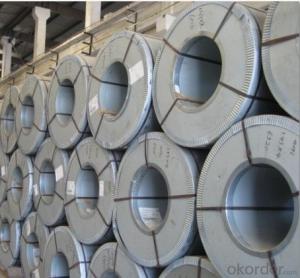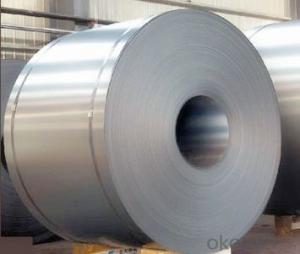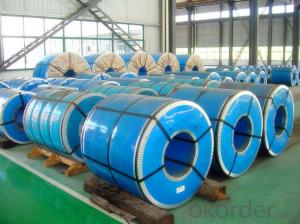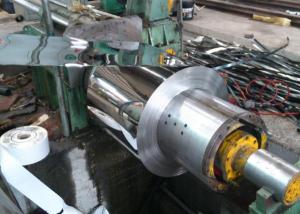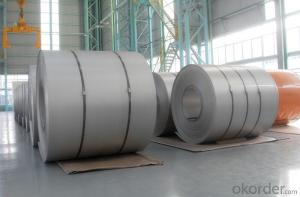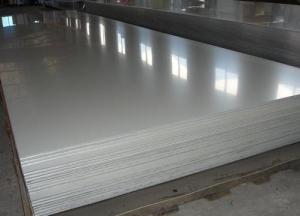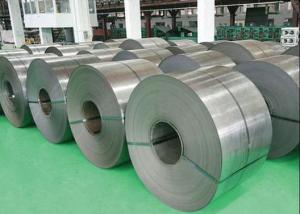Stainless Steel Coil Hot / Cold Rolled 201 Process
- Loading Port:
- Lianyungang
- Payment Terms:
- TT OR LC
- Min Order Qty:
- 400 m.t.
- Supply Capability:
- 5000 m.t./month
OKorder Service Pledge
OKorder Financial Service
You Might Also Like
Hot Rolled Stainless Steel Coil 201 Narrow Strip No.1 Finish
Packaging Detail: For customer's requirement
Delivery Detail: 10-30days
THK:2.3/2.5/3.0/4.0mm
Width:485/510/550/610/1010/1240mm
Face:No.1
201 Hot rolled stainless steel Coil Application
Stainless steel is a production which not easy rust,acid resistance and corrosion resistance,so it is widely
used in light industry,heavy industry,daily necessities and the decoration industry.
201 hot rolled stainless steel coil, use to produce cold rolled stainless steel coil and stainless steel tube, pipe.
201 Hot Stainless Steel Coil Chemical Composition(WT%)
(C):≤0.15, (Si):≤0.75, (Mn):5.5~7.50, (Cr):16.0~18.0, (N):≤0.25, (Ni):3.50~5.50, (P):≤0.060, (S):≤0.030
201 Hot Rolled Stainless Steel Coil
Strength Of Extension:100,000 To 180,000 Psi;
Yield Strength:50,000 To 150,000 Psi
Elongation :55 To 60%;
Modulus Of Elasticity:29,000,000 Psi;
Density :.280lbs/Cubic Inch(7.93g/Cm3)
- Q: How are stainless steel strips measured?
- Stainless steel strips are typically measured using two primary dimensions: thickness and width. The thickness is measured in millimeters or inches, while the width is measured in millimeters. These measurements provide the necessary information for determining the size and specifications of stainless steel strips.
- Q: What's the difference between stainless steel coil and stainless steel plate?
- One is a coil and the other is a strip.
- Q: What is the corrosion resistance in different environments of stainless steel strips?
- Stainless steel strips are known for their excellent corrosion resistance in various environments. This resistance is primarily due to the presence of chromium in the steel, which forms a passive layer of chromium oxide on the surface. This oxide layer acts as a protective barrier, preventing the underlying metal from being exposed to corrosive elements. In general, stainless steel strips exhibit good corrosion resistance in both atmospheric and aqueous environments. In atmospheric conditions, stainless steel strips can withstand exposure to moisture, oxygen, and pollutants without experiencing significant corrosion. This makes them suitable for outdoor applications such as architectural and marine structures. When it comes to aqueous environments, stainless steel strips offer varying levels of corrosion resistance depending on the specific grade and composition. For instance, austenitic stainless steels, such as Type 304 and 316, are highly resistant to corrosion in most organic and inorganic acids, as well as alkaline solutions. They are commonly used in industries such as chemical processing, food and beverage, and pharmaceuticals. Ferritic stainless steels, on the other hand, have lower corrosion resistance compared to austenitic grades but perform well in mildly corrosive environments such as freshwater and atmospheric exposure. They are often utilized in automotive applications, household appliances, and decorative purposes. Duplex stainless steels combine the best properties of both austenitic and ferritic grades, offering high corrosion resistance in a wide range of environments. They are particularly resistant to stress corrosion cracking and pitting, making them suitable for offshore and marine applications. It is important to note that while stainless steel strips generally have excellent corrosion resistance, their performance can still be influenced by factors such as temperature, concentration of corrosive agents, and mechanical stress. Therefore, it is essential to select the appropriate stainless steel grade based on the specific environment and application to ensure optimal corrosion resistance.
- Q: Are stainless steel strips suitable for elevator doors?
- Yes, stainless steel strips are highly suitable for elevator doors. Stainless steel is a durable and corrosion-resistant material, making it ideal for withstanding the wear and tear of daily elevator usage. Additionally, its sleek and modern appearance adds an aesthetic appeal to the elevator doors.
- Q: What are the dimensions of stainless steel strips?
- The dimensions of stainless steel strips vary depending on their specific application and manufacturer. However, common dimensions for stainless steel strips range from 0.1 to 3.0mm in thickness and 10 to 600mm in width.
- Q: How do you determine the grade of a stainless steel strip?
- The grade of a stainless steel strip is determined by its chemical composition, which includes the percentages of various elements such as chromium, nickel, and carbon. Additionally, the properties of the stainless steel strip, such as its corrosion resistance, strength, and heat resistance, are considered when determining its grade. Various testing methods, including spectroscopy and mechanical tests, are used to analyze these factors and assign the appropriate grade to the stainless steel strip.
- Q: What are the common uses of stainless steel strips in the chemical manufacturing process?
- Stainless steel strips are commonly utilized in the chemical manufacturing process due to their numerous beneficial properties. One of the primary uses of stainless steel strips is in the construction of storage tanks and vessels. These strips provide excellent corrosion resistance, which is essential when handling and storing various chemicals that can be highly corrosive. The stainless steel strips also offer high strength and durability, allowing them to withstand the harsh conditions often found in chemical manufacturing facilities. Another common application of stainless steel strips in the chemical manufacturing process is in the production of heat exchangers. Heat exchangers play a critical role in maintaining precise temperature control during chemical reactions and processes. Stainless steel strips are preferred for this purpose due to their exceptional thermal conductivity and resistance to oxidation at high temperatures. These properties ensure efficient heat transfer and prolonged operational lifespan of the heat exchangers, contributing to the overall productivity of the chemical manufacturing process. Additionally, stainless steel strips are employed in the fabrication of various piping systems within chemical plants. The strips are used to manufacture pipes, fittings, and valves that transport and control the flow of chemicals throughout the manufacturing process. Stainless steel's resistance to corrosion, both from the chemicals being transported and from external factors such as moisture and humidity, makes it an ideal material choice for these critical components. Furthermore, stainless steel's hygienic properties, as it is non-porous and easy to clean, make it suitable for industries where maintaining a high level of cleanliness and purity is paramount. Moreover, stainless steel strips find application in the production of filtration systems utilized in chemical manufacturing. These systems are responsible for removing impurities and contaminants from various chemical solutions, ensuring that the final product meets the required specifications. Stainless steel strips, with their excellent chemical resistance and mechanical strength, are often incorporated into filter screens and membranes, providing reliable and efficient filtration performance. In summary, stainless steel strips are widely used in the chemical manufacturing process for their outstanding corrosion resistance, durability, thermal conductivity, and hygienic properties. Whether in storage tanks, heat exchangers, piping systems, or filtration systems, stainless steel strips contribute to the efficiency, safety, and quality of chemical production.
- Q: Can stainless steel strips be used in aerospace applications?
- Yes, stainless steel strips can be used in aerospace applications. Stainless steel is known for its excellent corrosion resistance, strength, and high-temperature resistance, making it suitable for various aerospace components. It is commonly used in the construction of aircraft fuselages, wings, and engine components. Stainless steel strips provide structural support, durability, and resistance to extreme conditions found in aerospace environments, making them a reliable choice for the industry. Additionally, stainless steel's ability to withstand high levels of stress and its lightweight properties further contribute to its suitability for aerospace applications.
- Q: How are stainless steel strips packaged for shipping?
- To ensure the protection and prevent any damage during transportation, stainless steel strips are packaged for shipping in a meticulous manner. The packaging process comprises various steps that guarantee a safe delivery to the intended destination. To begin with, a protective material such as plastic or foam is used to carefully wrap the stainless steel strips. This ensures that scratches, dents, or any other surface damages are avoided during transit. Moreover, the protective material acts as a shield against moisture and other external elements that may potentially cause corrosion. Afterwards, the wrapped stainless steel strips are placed in sturdy cardboard boxes or wooden crates. The selection of these containers is based on the size and weight of the strips, providing adequate support and protection. To further enhance the safety, additional cushioning materials like foam inserts or bubble wrap are utilized to absorb any shocks or impacts that may occur during handling or transit. In order to secure the stainless steel strips even more, packaging materials such as strapping bands or stretch wrap are utilized to hold the bundles together. This effectively prevents any movement or shifting of the strips inside the packaging, thereby reducing the risk of damage. Furthermore, accurate labeling is of utmost importance for proper identification and handling during shipping. Each package is labeled with essential information including the product description, dimensions, weight, destination address, and any other necessary instructions. Lastly, the packaged stainless steel strips undergo a thorough quality control check to ensure that all packaging requirements are met. This involves the verification of the integrity of the packaging materials, confirmation of the accuracy of labeling, and a final inspection to ensure that the strips are adequately protected. To summarize, the packaging of stainless steel strips for shipping entails wrapping them in protective materials, placing them in sturdy containers with cushioning, securing the bundles, accurately labeling them, and conducting quality control checks. These packaging measures are crucial to guarantee the safe transportation of stainless steel strips and to prevent any damage or corrosion during shipping.
- Q: How are stainless steel strips manufactured?
- Stainless steel strips are manufactured through a process called hot rolling, where stainless steel ingots are heated and passed through a series of rolling mills to reduce their thickness and shape them into long, thin strips. The strips are then annealed to relieve any stresses and improve their mechanical properties. Finally, they undergo pickling and passivation treatments to remove impurities and enhance corrosion resistance.
Send your message to us
Stainless Steel Coil Hot / Cold Rolled 201 Process
- Loading Port:
- Lianyungang
- Payment Terms:
- TT OR LC
- Min Order Qty:
- 400 m.t.
- Supply Capability:
- 5000 m.t./month
OKorder Service Pledge
OKorder Financial Service
Similar products
Hot products
Hot Searches
Related keywords
